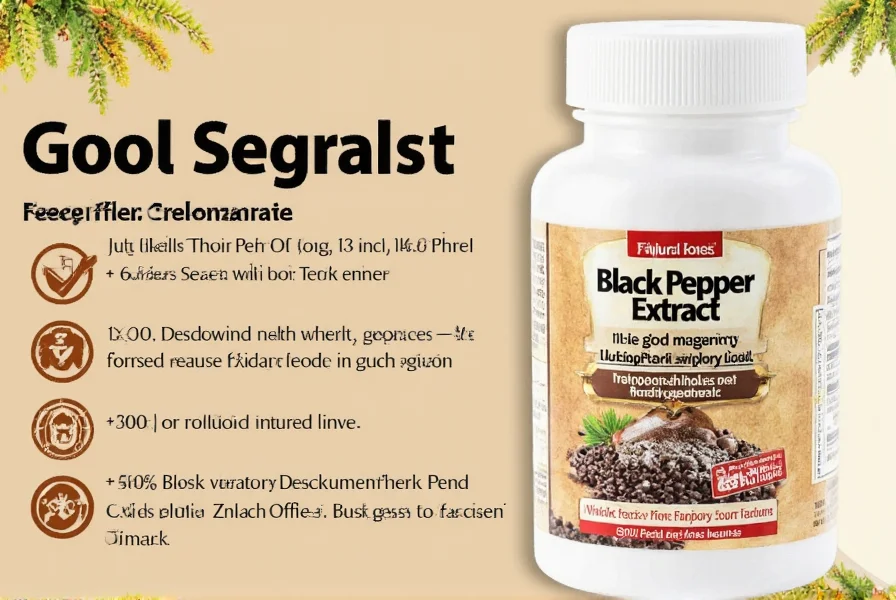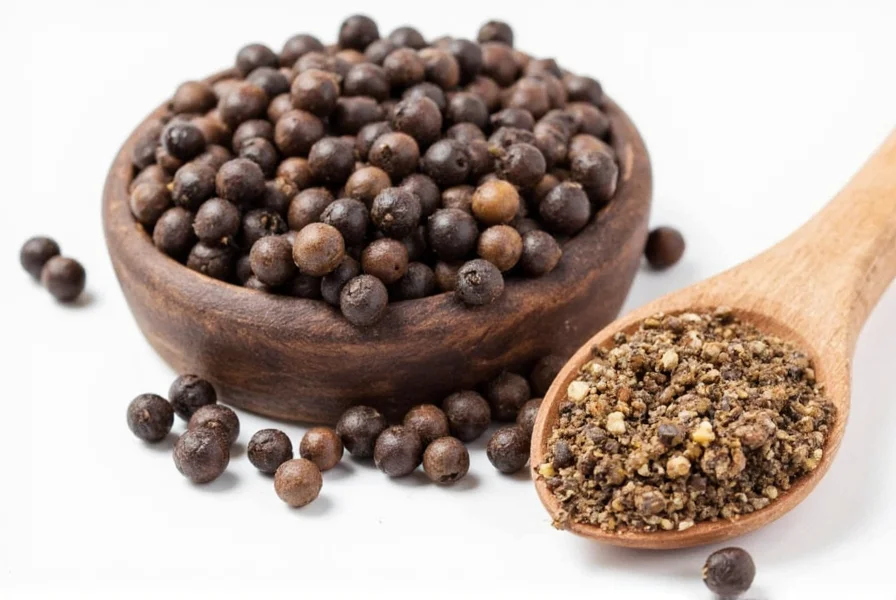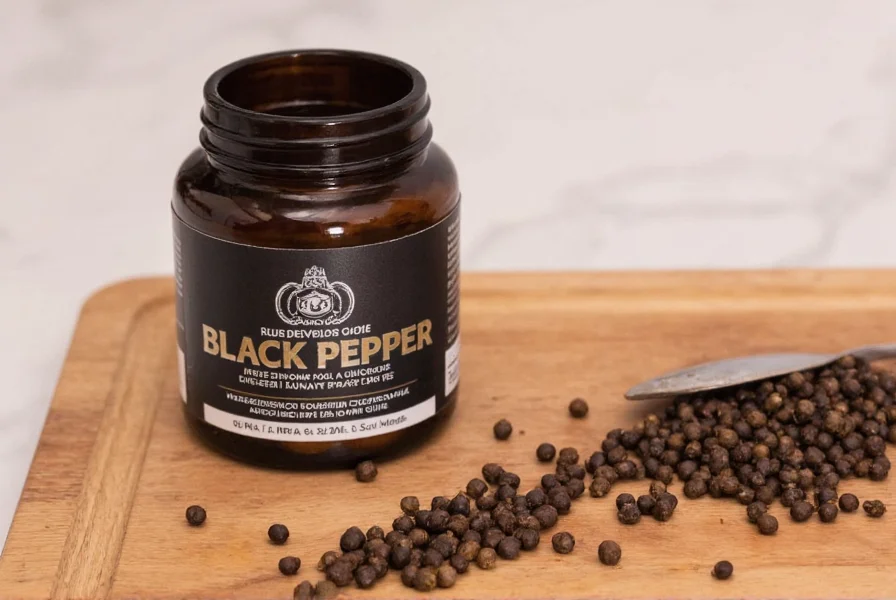For health-conscious individuals exploring natural supplements, black pepper extract represents one of the most scientifically validated bioavailability enhancers available. Unlike regular black pepper seasoning, this concentrated form delivers therapeutic levels of piperine—the active compound responsible for its physiological effects. Understanding its mechanisms, evidence-based applications, and proper usage can help consumers make informed decisions about incorporating it into their wellness routines.
What Exactly Is Black Pepper Extract?
Black pepper extract differs significantly from the common kitchen spice. While whole black peppercorns contain only 5-9% piperine, commercial extracts standardize to 95% piperine concentration through solvent extraction processes. This standardization ensures consistent potency that regular pepper cannot provide. The extraction process typically involves:
- Initial grinding of dried peppercorns
- Solvent-based extraction (often ethanol or methanol)
- Concentration and purification
- Standardization to specific piperine percentages
This concentrated form allows for precise dosing in supplement formulations, particularly valuable when combined with other compounds that suffer from poor absorption.

The Science Behind Bioavailability Enhancement
Piperine's most well-documented effect involves its ability to increase the bioavailability of various nutrients and medications. Research published in Planta Medica demonstrated that piperine inhibits certain digestive enzymes and slows intestinal transit time, allowing more complete absorption of co-administered compounds.
The most famous example involves curcumin, the active compound in turmeric. Without piperine, curcumin has notoriously poor absorption—only about 1% enters the bloodstream. However, studies show that adding just 20mg of piperine increases curcumin bioavailability by 2,000%. This dramatic enhancement explains why many high-quality turmeric supplements include black pepper extract.
| Compound | Absorption Increase with Piperine | Key Research Finding |
|---|---|---|
| Curcumin | Up to 2,000% | Shoba et al., 1998 study showed 20x higher blood levels |
| Resveratrol | Approximately 229% | Increased plasma concentration in animal models |
| Coenzyme Q10 | About 30% | Improved absorption in human clinical trials |
| Vitamin B6 | Nearly 100% | Enhanced plasma levels observed in studies |
Evidence-Based Health Benefits
Beyond its role as a bioavailability enhancer, black pepper extract offers several direct health benefits supported by scientific research:
Nutrient Absorption Enhancement
The primary application of black pepper extract involves improving the absorption of various nutrients and phytochemicals. This makes it particularly valuable in supplement formulations where bioavailability is typically low. Research shows significant enhancement for:
- Curcuminoids from turmeric
- Resveratrol from grapes and berries
- Green tea catechins
- Certain fat-soluble vitamins
Antioxidant Properties
Studies in the Journal of Agricultural and Food Chemistry demonstrate that piperine exhibits significant antioxidant activity, helping protect cells from oxidative damage. Unlike many antioxidants, piperine appears to work through multiple mechanisms, including free radical scavenging and enhancement of the body's natural antioxidant systems.
Metabolic Support
Emerging research suggests piperine may support healthy metabolism. A study in Phytotherapy Research found that piperine supplementation influenced thermogenesis and fat metabolism in animal models. While human research is still developing, these findings suggest potential applications for metabolic health.
Practical Usage Guidelines
When incorporating black pepper extract into your supplement regimen, consider these evidence-based recommendations:
Dosage Considerations
Most research uses 5-20mg of standardized piperine (95% concentration) daily. Higher doses don't necessarily provide additional benefits and may increase the risk of side effects. The optimal dose depends on your specific needs:
- For general bioavailability enhancement: 5-10mg daily
- When paired with curcumin: 5mg per 500mg of curcumin
- Maximum studied dose: 20mg daily
Timing and Combination
For best results, take black pepper extract simultaneously with the compounds you want to enhance absorption of. Many quality supplements combine piperine with other ingredients in the same capsule for this reason. Taking it with food may further improve absorption while reducing potential gastrointestinal effects.
Safety Profile and Considerations
Black pepper extract demonstrates an excellent safety profile at standard doses, but certain considerations are important:
Potential Side Effects
Most people tolerate black pepper extract well, but some may experience:
- Mild gastrointestinal discomfort at higher doses
- Heartburn in sensitive individuals
- Rare cases of skin irritation with topical use
Medication Interactions
Because piperine affects drug metabolism enzymes, it may interact with certain medications. Consult your healthcare provider before using black pepper extract if you take:
- Blood thinners like warfarin
- Antidepressants
- Antihypertensive medications
- Immunosuppressants
Quality Considerations
When selecting a black pepper extract supplement, look for:
- Standardized to 95% piperine content
- Third-party testing verification
- Transparent sourcing information
- Reputable manufacturer with good manufacturing practices

Current Research Limitations
While the evidence for black pepper extract's bioavailability effects is strong, several limitations exist in the current research:
- Most human studies focus on short-term use (4-12 weeks)
- Long-term safety data is limited
- Research on standalone benefits (without other compounds) is less extensive
- Individual responses may vary based on genetics and gut health
Scientists continue to investigate black pepper extract's potential applications in areas like cognitive health, inflammation management, and metabolic support. However, more rigorous human trials are needed before definitive conclusions can be drawn in these areas.
Conclusion
Black pepper extract represents one of the most scientifically supported bioavailability enhancers available. Its ability to dramatically improve the absorption of various nutrients makes it a valuable component in many supplement formulations, particularly when paired with compounds like curcumin that suffer from poor bioavailability. At standard doses of 5-20mg daily, it demonstrates an excellent safety profile for most people, though those taking certain medications should consult healthcare providers due to potential interactions. As research continues to evolve, black pepper extract remains a promising natural compound with well-documented benefits for nutrient absorption and potential applications in broader health support.
Frequently Asked Questions
Does black pepper extract really increase curcumin absorption?
Yes, multiple studies confirm this effect. Research published in Planta Medica demonstrated that adding 20mg of piperine (the active compound in black pepper extract) increases curcumin bioavailability by up to 2,000%. This dramatic enhancement occurs because piperine inhibits certain digestive enzymes and slows intestinal transit time, allowing more complete absorption of curcumin.
What's the difference between black pepper and black pepper extract?
Regular black pepper contains only 5-9% piperine, while standardized black pepper extract typically contains 95% piperine. This concentration difference means you would need to consume impractical amounts of regular pepper (approximately 20 teaspoons) to achieve the same piperine content as 5mg of extract. The extraction process removes other compounds found in whole pepper, delivering a consistent, therapeutic dose of piperine.
Can black pepper extract interact with medications?
Yes, black pepper extract may interact with certain medications because piperine affects drug metabolism enzymes. It can potentially increase the absorption and effects of blood thinners, antidepressants, antihypertensive medications, and immunosuppressants. If you take prescription medications, consult your healthcare provider before using black pepper extract supplements to avoid potential interactions.
What's the optimal dosage of black pepper extract?
Research suggests 5-20mg of standardized black pepper extract (95% piperine) daily provides optimal benefits. For general bioavailability enhancement, 5-10mg daily is sufficient. When paired with curcumin, use approximately 5mg of piperine per 500mg of curcumin. Higher doses don't necessarily provide additional benefits and may increase the risk of gastrointestinal side effects.
Are there any side effects of black pepper extract?
Most people tolerate black pepper extract well at standard doses. Some may experience mild gastrointestinal discomfort or heartburn, particularly at higher doses. These effects are usually temporary. Black pepper extract is generally considered safe for most adults when used appropriately, but those with gastrointestinal conditions or taking certain medications should consult healthcare providers before use.











 浙公网安备
33010002000092号
浙公网安备
33010002000092号 浙B2-20120091-4
浙B2-20120091-4